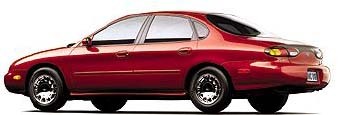 |
FLASHBACK! - 1997 Ford Methanol Taurus Costs Less than Gas Model
WASHINGTON, Aug. 27, 1996; The Ford Motor Company is offering an "Unlimited" number of Taurus FFV (flexible fuel vehicle) sedans for the 1997 model year at a discounted sticker price of $345 less than the conventional gasoline-powered Taurus. Ford is offering the Taurus FFVs, capable of running on methanol (or ethanol) and unleaded gasoline, for sale to fleet purchasers.
"When it comes to alternative fuel vehicles, Ford is in the driver's seat," said American Methanol Institute President Raymond A. Lewis. "Ford is the only automaker offering a full line of alternative fuels vehicles -- including methanol -- and the only automaker to ever sell an alternative fuel vehicle for less than the gasoline model. The company's decision to offer an unlimited number of Taurus FFVs was made, quite simply, because the cars sell. Ford sold out its production run of 5,300 Taurus FFVs last year, and orders have exceeded production quotas for the last three years."
The methanol Taurus FFV operates on M-85, a blend of 85% methanol and 15% unleaded gasoline or any mixture of the two fuels in the same fuel tank. The Taurus FFV is an ideal alternative fuel vehicle for fleet operators that require the ability to fuel with conventional fuels when vehicles operate outside their normal service territory.
The majority of methanol Taurus FFVs sold are placed into service in California. Since the early 1980s, the State of California has pioneered the development and introduction of flexible fuel vehicles. Today, in California over 13,000 methanol FFVs serve in federal, state and municipal governments fleets, corporate fleets, rental car fleets, and are driven by hundreds of individual consumers.
To serve these vehicles, an extensive network of 60 public methanol refueling stations stretches from Los Angeles to Sacramento, including a station in Yosemite National Park. This methanol fueling infrastructure was established by the California Energy Commission in cooperation with the State's major gasoline retailers. In addition, more than 50 private fueling stations are operated in California by individual fleet operators.
Outside of California, there are an additional 40 methanol fueling stations located in 14 states and Canada. This includes 9 methanol stations operated by the New York State Thruway Authority at maintenance areas located along the length of the highway from the Tappan Zee Bridge to Buffalo.
Methanol fueling stations are relatively inexpensive to build and operate. A below-ground methanol tank and fueling system can be installed for about $50,000, while a 2,000-gallon above-ground fueling system costs around $20,000 to install.
Methanol is a liquid alcohol fuel made from clean, domestic natural gas. In 1995, methanol production capacity from 17 U.S. plants in 8 states totaled 2.2 billion gallons. These plants meet three-quarters of U.S. methanol demand. The remaining supply comes from imports of which Canada supplies well over one-half. In 1995, 90% of methanol supplied to the U.S. was produced in North America, 8% from Trinidad, Venezuela and Chile, with the remaining 2% produced in Europe, Asia and the Middle East.
The largest market for methanol in the U.S. is for the production of methyl tertiary butyl ether or "MTBE." Produced in nearly 50 U.S. plants in 14 states, it is estimated that 3.3 billion gallons of MTBE will be used in 1996 for blending in clean, reformulated gasoline.
The American Methanol Institute (AMI) serves as the voice of the methanol industry in Washington and across the country. AMI works to support the use of clean reformulated and oxygenated gasoline, promote the use of methanol as an alternative fuel, and encourage the development of emerging methanol- powered fuel cells.


